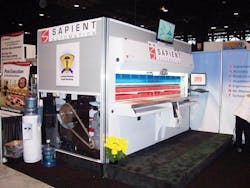Material Handling System: Reliability Comes Around Again
It's still pretty early in 2011, so how is it possible for a three-month-old material handling machine builder to assemble three new machines in such a short time and compete with firms that have been around for decades? Well, of course, by stocking up on experienced managers, engineers and other staffers, and starting to build machines before the new company officially is launched.
Sapient Automation (www.getsapient.com) in Doylestown, Pa., opened its doors on Jan. 1, 2011. However, despite its officially newborn status, the new company has an "old soul" in the form of veterans from White Systems, Kardex Remstar and other longstanding material handling firms.
Sapient exhibited its seven-month-old Avenger vertical carousel (VC) high-density vertical storage and retrieval system at the ProMat 2011 show last month at McCormick Place in Chicago. It also presented information about its new Viper vertical lift module (VLM) storage and retrieval system, as well as its Hornet horizontal carousel (HC) storage and retrieval system. The machines handle everything from pharmaceuticals to small electronic parts.
President and CEO John Molloy and chief marketing officer Ed Romaine say they and their colleagues started the new company because they believe the recent "value engineering" trend in material handling machines has gone too far, and become "devalued engineering." "In the past three or four years, CAD/CAM-based designs have been all about taking more and more steel out of material handling equipment, and so they're getting thinner and lighter, but we think they've also ended up being poorer-quality components and machines that don't have enough reliability," Romaine says.
Sapient's Avenger VC high-density vertical storage and retrieval system uses heavy-duty hardware and machine health monitoring to provide reliable, consistent material storage, access and retrieval.
Source: Sapient Automation
For instance, Molloy reports that the scissor arms and assemblies, which hold and move the many shelves inside VCs, are the primary location where these machines eventually fail. However, many of today's carousels only use one lightweight piece of steel in their scissor arms, even though this will make them wear out sooner. "This is designed-in obsolescence, but customers go for it because of the low price, and then realize their mistake later," Romaine adds. "We decided to get back to better reliability and offer a much heavier-duty scissor arm with a multi-year warranty because users, such as hospital pharmacies, must have immediate, consistent access to their inventories to maintain quality and compete globally."
To further aid consistent operations, Sapient added dozens of internal maintenance sensors to Avenger that feed signals every three seconds to its Intelligent Machine Health Monitoring System. "Many of us have been waiting 15 years to add this capability to automatic handling and storage of critical items," Romaine explains. "Finally, this kind of health monitoring also is available to let users know what's going on in their machine on a second-to-second basis, so they can be sure of its availability and be proactive about maintenance and any future problems."
Avenger's 10-16 carriers, which can have two shelves each, are driven by a 2 or 3 hp motor and MoviTrac drive from SEW-Eurodrive (www.seweurodrive.com), and these are controlled by a DirectLogic 06 PLC from AutomationDirect (www.automationdirect.com). This drive system is stable enough that an entire shelf can be removed for maintenance, but the rest of the machine can continue to run normally, Romaine adds.
In addition, end-user orders and information go through Avenger's Shark order fulfillment software on its HMI screens, and confirmation and accuracy are aided by pick-to-light LEDs at the access points, which can be on either side or on top of the machine. Sections of the machine were assembled at one of Sapient's contractor/suppliers in Argentina, and at its plant and warehouse in Hatfield, Pa.
"Shark software optimizes batches, so users can pick multiple orders simultaneously. Avenger can complete 10 orders in one rotation," Romaine says. "In the future, I think we're going to see RFID tags on individually shelved items, an RFID antenna at the access point, and RFID badge on users, which will allow a complete inventory with each rotation, and take just-in-time manufacturing down to minutes."



